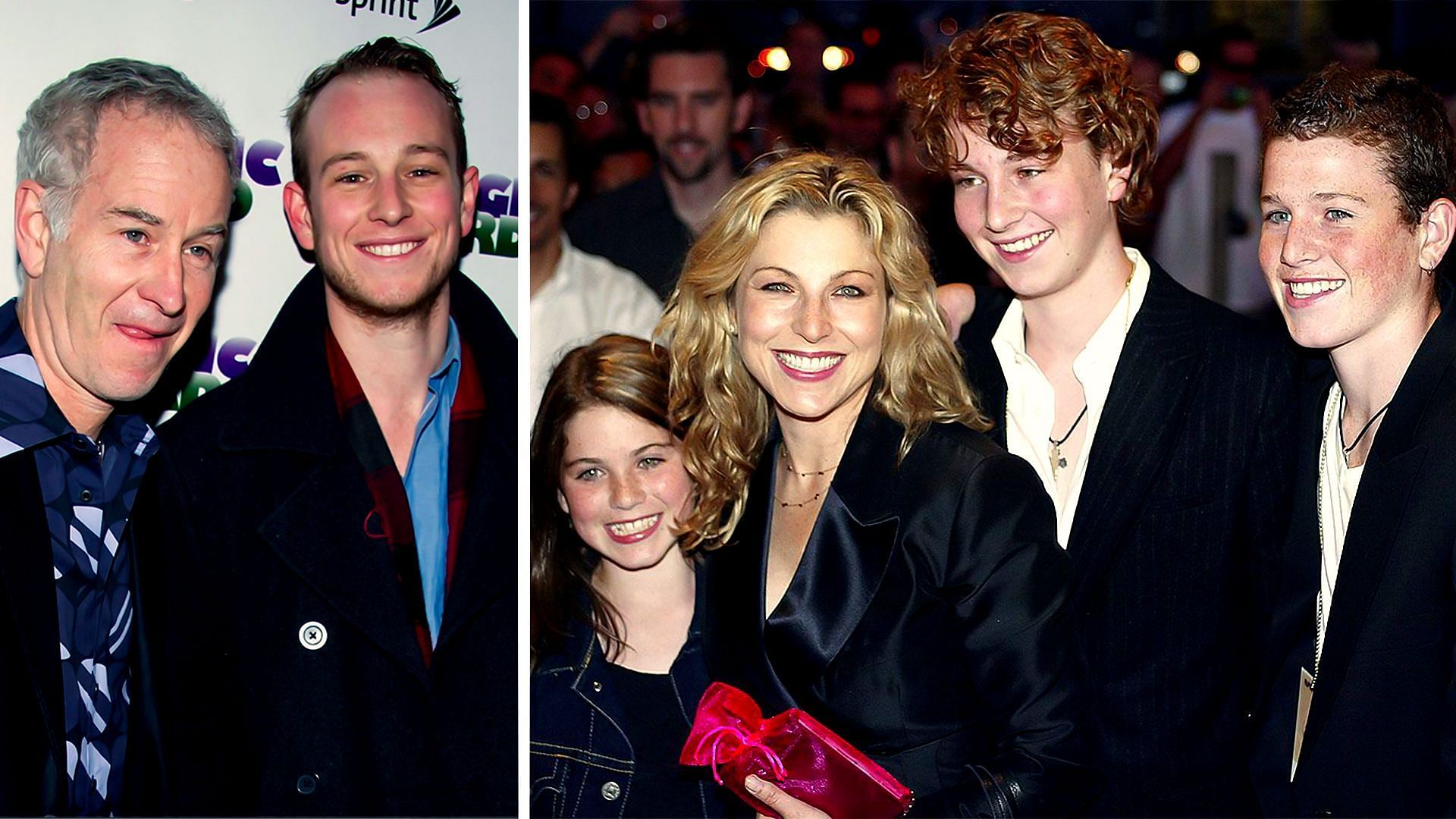Kevin McEnroe: Unraveling The Truth Behind His Wheelchair Use
In the age of instant information and pervasive social media, public figures often find their lives, both personal and professional, subjected to intense scrutiny. One question that has occasionally surfaced in online discussions and fan forums, sparking curiosity and concern, is: why is Kevin McEnroe in a wheelchair? This inquiry, while seemingly straightforward, delves into the complex interplay of public interest, personal privacy, and the responsible dissemination of information.
Understanding the truth behind such questions requires a careful approach, distinguishing between verified facts and speculative rumors. When it comes to the health and personal circumstances of individuals, especially those with a degree of public recognition, the absence of explicit information often fuels conjecture. Our aim here is to explore the known aspects of Kevin McEnroe's public profile and address the prevailing question with a focus on accuracy, empathy, and respect for privacy.
Table of Contents
- Who is Kevin McEnroe? A Glimpse into His Life and Legacy
- The Core Question: Why is Kevin McEnroe in a Wheelchair?
- Navigating the Information Void: Separating Fact from Speculation
- Understanding Mobility Aids: Beyond the Obvious
- The Media Landscape and Celebrity Reporting
- Empathy and Respect: A Call for Consideration
- Supporting Public Figures While Respecting Their Boundaries
- Conclusion: Prioritizing Privacy and Informed Understanding
Who is Kevin McEnroe? A Glimpse into His Life and Legacy
Before addressing the specific question of why is Kevin McEnroe in a wheelchair, it's essential to establish who Kevin McEnroe is. Born into a lineage of significant public figures, Kevin McEnroe is the son of tennis legend John McEnroe and acclaimed actress Tatum O'Neal. This background naturally places him in the public eye, albeit often through the lens of his famous parents. Unlike his father, who dominated the tennis courts, or his mother, who graced the silver screen from a young age, Kevin has largely pursued a life away from the direct glare of mainstream celebrity. He is known for his work as a writer, having published a novel titled "Our Town" in 2017, which garnered critical attention.
His artistic pursuits and relatively private life mean that details about his personal health are not widely publicized. Just as we might reflect on historical figures like "King George of England" and how even seemingly trivial details, such as "why King George of England may have to lose his beard," could become topics of public discussion, the lives of modern public figures, even those who seek privacy, often invite scrutiny. The public's fascination, sometimes akin to "the game of 'beaver' which all England is playing," can unfortunately threaten "the proper reverence for the throne" – or in this context, the individual's right to privacy.
Personal Data / Biodata of Kevin McEnroe
| Attribute | Detail |
|---|---|
| Full Name | Kevin McEnroe |
| Date of Birth | May 23, 1986 |
| Place of Birth | New York City, USA |
| Parents | John McEnroe (Father), Tatum O'Neal (Mother) |
| Siblings | Emily McEnroe, Anna McEnroe, Ruby McEnroe, Sean O'Neal |
| Occupation | Writer |
| Notable Work | "Our Town" (Novel, 2017) |
| Nationality | American |
The Core Question: Why is Kevin McEnroe in a Wheelchair?
Directly addressing the central question: Is Kevin McEnroe in a wheelchair? And if so, why? The most crucial point to understand is that there is no widely reported or publicly confirmed information indicating that Kevin McEnroe uses a wheelchair. Online searches and media archives do not yield credible reports or images that suggest he has a permanent or even temporary need for a wheelchair. The question itself seems to stem from a misunderstanding or perhaps a misidentification, as is often the case with celebrity-related queries.
With the above stated, one might ask for the reason why this question persists. In the absence of concrete information, public curiosity can sometimes lead to the proliferation of unverified claims. "Why is it like that?" is a common human response to anything perceived as unusual or unexplained, and in the digital age, these questions can quickly propagate, sometimes without a factual basis. It highlights the importance of relying on verifiable sources and understanding that not every aspect of a public figure's life is, or should be, public knowledge.
Navigating the Information Void: Separating Fact from Speculation
In the realm of celebrity news, the line between fact and fiction can often blur. When a question like "why is Kevin McEnroe in a wheelchair" arises without any supporting evidence, it serves as a prime example of how speculation can take root. For information to be considered reliable, it typically requires corroboration from multiple, reputable sources. "Answers without enough detail may be edited or deleted" in professional contexts, and this principle should extend to how we consume and share information about individuals.
The internet, while a powerful tool for information, also acts as a breeding ground for rumors. A single misheard phrase or a misidentified photograph can spark a widespread belief. It's a phenomenon that, in a way, mirrors the complexities of language itself. "The rules of English grammar are the very reason why such strange things happen in the first place" – sometimes, the way information is structured or interpreted can lead to unintended or incorrect conclusions, much like grammatical nuances can alter meaning. Our collective responsibility is to seek out detailed, cited information rather than perpetuating unfounded claims.
The Role of Privacy in Public Life
Even for public figures, privacy remains a fundamental right. Celebrities, despite their visibility, are entitled to keep personal matters, especially health-related ones, confidential. The persistent inquiry into private aspects of their lives, such as asking "why is Kevin McEnroe in a wheelchair," can be intrusive and disrespectful. There's a societal debate about the boundaries of public curiosity versus private sanctity. We might ponder "why is 'c*nt' so much more derogatory in the US than the UK," or "why is the word pussy often used to mean coward," and how these linguistic and cultural differences reflect broader societal attitudes towards certain topics or individuals. Similarly, the public's perception of what is acceptable to ask or assume about a celebrity's health is constantly evolving, and often, the answer should simply be: it's not our business.
Respecting privacy means understanding that not every question needs an answer, especially when it pertains to an individual's personal well-being. The lack of information about Kevin McEnroe's health status regarding wheelchair use is, in itself, a strong indicator that there is no public issue to address. It underscores his choice to maintain a private life concerning such matters, a choice that should be respected.
Understanding Mobility Aids: Beyond the Obvious
While there's no evidence to suggest Kevin McEnroe uses a wheelchair, it's beneficial to understand the broader context of mobility aids. Wheelchairs are essential tools for millions of people worldwide, enabling independence and mobility for various reasons. These reasons can range from temporary injuries, such as a broken leg, to chronic conditions like multiple sclerosis, spinal cord injuries, or severe arthritis. They are not solely indicative of permanent disability; sometimes, they are used for energy conservation, pain management, or during recovery periods.
Historically, human mobility has been understood primarily through the concept of "on foot." "The idiom on foot goes back very far in English," reflecting a time when walking was the primary mode of personal transport. Marlowe includes this exchange in Doctor Faustus (1592): "What, will you go on horse?" – highlighting the alternative of horseback. Today, mobility aids like wheelchairs represent a modern evolution, providing crucial support and freedom for individuals whose "foot" may not be able to carry them as before, or who simply need assistance. Understanding this broad spectrum helps to destigmatize their use and fosters a more inclusive perspective.
Common Misconceptions About Wheelchair Use
There are many misconceptions surrounding wheelchair use. One common assumption is that using a wheelchair always implies a complete inability to walk. This is often untrue; many wheelchair users can walk short distances, stand, or transfer with assistance. Another misconception is that wheelchair use is always permanent. As mentioned, temporary use for recovery is very common.
The societal "why" behind certain perceptions can be complex. Just as one might ask, "Why are psychiatrists called that? Is it like my head is swollen [from anguish, misery, stress]?" – reflecting a public misunderstanding or even stigma about mental health professions – similar questions and stigmas can attach to physical mobility aids. "I understand that the word spook is a racial slur... What I don't understand is why" it rose in usage, points to the profound impact of language and perception, even when the underlying reasons are unclear or rooted in prejudice. Dispelling these misconceptions requires education and open dialogue, fostering a more informed and empathetic public.
The Media Landscape and Celebrity Reporting
The digital age has transformed celebrity reporting. The drive for clicks and engagement can sometimes overshadow the commitment to accuracy and ethical reporting. Sensational headlines and unverified claims, much like "over use of punctuation marks has the opposite of the intuitive effect, becoming" distracting and ultimately less impactful, can dilute the truth and mislead the public. When questions like "why is Kevin McEnroe in a wheelchair" circulate without factual basis, it highlights a failure in the information ecosystem.
Responsible journalism and content creation adhere to strict standards. Information should be verified, and privacy should be respected. Reputable sources will typically not report on private health matters unless the individual has chosen to make them public. The absence of such reporting from credible outlets regarding Kevin McEnroe's alleged wheelchair use is a strong indicator that the premise of the question is unfounded. It's a reminder that not everything heard or read online is true, and critical thinking is paramount.
Empathy and Respect: A Call for Consideration
In discussions about public figures, especially concerning their health, empathy and respect should always be at the forefront. While there's a natural human curiosity, particularly about the lives of those in the public eye, this curiosity should not infringe upon an individual's right to privacy and dignity. Instead of asking "why does everybody want to help me whenever I need someone's help?" in a way that implies intrusive curiosity, we should consider how our inquiries might impact the individual.
It's a testament to the complexities of human interaction and public perception. "English is fun, as to" its nuances and how phrases can be interpreted in various ways. This applies not just to language but to how we perceive and interact with public figures. Our collective approach should lean towards understanding and support, rather than speculation and intrusion. The best way to "help" a public figure in this context is often to respect their boundaries.
The Power of Language and Interpretation
The very existence of the question "why is Kevin McEnroe in a wheelchair" underscores the power of language and how it shapes perception. A simple phrase, even if based on a misunderstanding, can create a narrative. Consider the confusion that can arise from seemingly simple linguistic choices, such as "I am often confused how the word English should be written in phrases such as English language, because I have seen both variants, Capitalized and starting with lowercase letter." These small variations can lead to different interpretations or questions. Similarly, a fleeting image or an unconfirmed rumor can lead to widespread assumptions about a person's life.
Understanding the etymology of words or phrases, even something like "I know it originates from head shrinking, but it doesn't help me a lot to understand the etymology, Why are psychiatrists called that," reveals how deeply ingrained perceptions can be. This depth of understanding should extend to how we discuss individuals. Our language should be precise, respectful, and grounded in fact, particularly when addressing sensitive topics like health.
Supporting Public Figures While Respecting Their Boundaries
For fans and the general public, supporting public figures means appreciating their work and respecting their personal space. This includes refraining from spreading or seeking out unverified information about their private lives, especially concerning health. If a public figure chooses to share details about their health, it will typically come directly from them or their authorized representatives. Until then, the most supportive stance is one of respect and non-intrusion. "That's all there is to it" – sometimes, the simplest answer is the most profound: respect privacy.
So, with that all in mind, the best approach is to focus on Kevin McEnroe's contributions as a writer and respect his decision to keep his personal health matters private. This aligns with ethical principles of journalism and general human decency. The absence of information is not an invitation for speculation but a signal to respect boundaries.
Conclusion: Prioritizing Privacy and Informed Understanding
In conclusion, the question "why is Kevin McEnroe in a wheelchair" appears to be based on an unsubstantiated premise. There is no credible public information or evidence to suggest that Kevin McEnroe uses a wheelchair. His life, while connected to famous parents, has largely been one of artistic pursuit and relative privacy, particularly concerning his health.
This discussion serves as a crucial reminder of the importance of media literacy, critical thinking, and empathy in the digital age. Just as "The reason why hugs and kisses is rendered xoxo and not oxox is unknown. However, according to scoopwhoop, it's under debate," some things remain unknown or debated, and it's perfectly acceptable, and often necessary, to acknowledge that. When it comes to the private lives of individuals, especially their health, the most responsible action is to respect their privacy and refrain from perpetuating unverified claims.
We encourage our readers to always seek information from reliable sources and to approach discussions about public figures with a sense of responsibility and respect. If you found this article insightful, consider sharing it to promote responsible discourse, or explore other articles on our site that delve into media ethics and public perception.

What are John McEnroe and Tatum O'Neal’s children doing now? All about

"Almost impossible to get the approval you want, I had to grapple with

Kevin mcenroe Banque de photographies et d’images à haute résolution